Locavorism in Beijing: Is "Local" the New "Organic"?
“本土食品”是新的“绿色食品”吗?
Originally presented at Pecha Kucha Beijing Vol. 88 on November 28, 2009. Chinese translation by Yuanxi Huang.
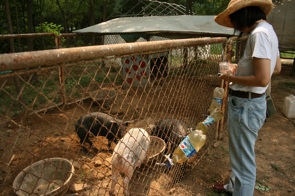
Six years ago, when Lejen Chen and her husband wanted Romaine lettuce for Caesar salads in their restaurant Mrs. Shanen's, they couldn't find the lettuce readily and realized they'd have to grow it themselves. They started with two greenhouses, and that experiment has expanded into the almost 15-acre Green Cow Farm, which in the summer supplies about 95 percent of the restaurant's produce.
六年前, 陈礼贞和她丈夫想用长叶莴苣做凯撒沙拉,以供应到他们的饭馆“单太太厨房”里,可结果他们发现要自己种这种蔬菜才行。于是他们建立了两个温室大棚,而今这个当初的试验品已经成长为一个将近15英亩的“绿牛农场”。这个农场在夏季的时候能供应他们餐馆所需的95%的产品。
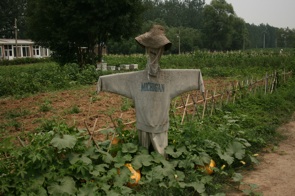
Chen says: "When you grow your own food, you're more in touch with nature and how you have to preserve the natural system and protect the soil. Without good soil you can't have healthy plants, and without healthy plants you can't have nutritious food."
陈礼贞说:“当你种植自己的食品时,你会跟大自然有更亲密的接触,更清楚应该如何保护自然生态系统,保护土壤。没有好的土壤你无法收获健康的作物,而没有健康的作物你就无法做出有营养的食物。”
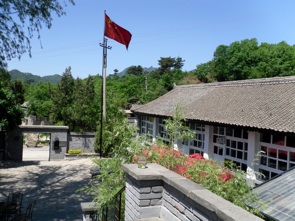
This spring, the Schoolhouse at Mutianyu launched a sustainable food program at its three restaurants, the Schoolhouse Canteen, the Roadhouse, and Xiaolumian. The program includes growing herbs, vegetables, fruit, and nuts as well as composting kitchen waste. They recently switched from Australian to Chinese steaks and buy from local producers whenever possible.
今年春天,慕田峪的小园在他们的三间餐厅里开展了一个可持续发展食物项目。这三间餐厅是小园餐厅,大路馆和小庐面。这个项目包括种植草本植物、蔬菜、水果和坚果,以及用厨房废弃物做混合肥料。最近他们把澳大利亚牛排换成了中国牛排,并尽可能地从当地生产者手中购买。
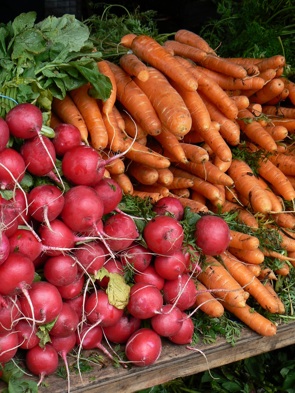
In the past half-decade or so, a local-food movement has grown in the West. The idea is that you save energy by buying food grown closer to home, rather than food that's been shipped across countries or continents. When I was living in Brooklyn, I would often shop at the McCarren Park farmers' market. Living here, I realized Beijing has a similar setting—a big city surrounded by farmland—but there's less information about eating locally here.
在过去的差不多五年中,西方国家兴起了一项支持本地食品的运动。它的理念是购买家附近种植的食物,比从另一个国家或另一个洲远途运来的食物更节约能源。我原来住在布鲁克林的时候,经常到麦卡伦公园农产品市场去采购。而且我发现北京也有一个相似的环境——一个四周被农田包围的大城市——但这里对于进食本地食品的信息少一些。

A "locavore" (sometimes spelled "localvore") is a term coined by a group of food activists in California to describe people who eat only foods grown or produced near where they live. The exact parameters vary—some suggest eating food that comes from within 100 or 250 miles of your home. One food writer considers it "eating within the boundaries and the seasons of the place I live in."
“土食者”这个词是美国加州的一群食物活动家发明的,用来描述那些只吃他们居住地附近生长或生产出来的食物的人。 具体的参数不是一成不变的——有些人建议吃来自家周围方圆100英里至250英里之内的食物。一位食物作家认为它指的是“吃在我住处附近一定范围内并且当季的食物”。
Eating local food supports local businesses and farmers. The food is also often fresher because it's straight from the farm. When you buy from local sources, it's easier to know where your food is coming from and get to know your suppliers. Some farms in Beijing will actually let you come out for a visit. And then, of course, less energy is used in transporting food.
吃本地食物能够支持本地商户和本地农民,而且食物也通常比较新鲜,因为直接来自于农场。当你从本地货源购买食物时,更容易知道所吃的食物来自哪里,并对你的供应商有更多的了解。其实北京有些农场也愿意让你去参观。此外,当然也就是可以减少食物运输过程中的能量损耗。
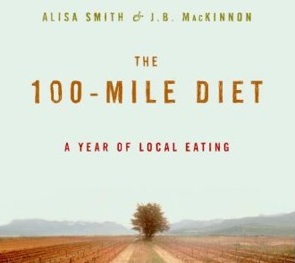
James MacKinnon and Alisa Smith are a couple from Vancouver who spent a year eating only food from within 100 miles of their home and wrote about it in The 100-Mile Diet. "Local food is usually fresher, tastier, and more nutritious—think about the difference between a typical supermarket tomato that was picked green and ripened with ethylene gas, and a field tomato that ripened in the sun and was harvested right at its peak of flavor," James emailed to me.
James MacKinnon和Alisa Smith是一对来自温哥华的夫妇,他们花了一年的时间只食用来自家附近方圆一英里内的食物, 并将此写作成书 《100英里食品族》。“本地食物通常比较新鲜,味道比较鲜美,而且更有营养——想想看典型的那种超市里的西红柿和田地西红柿的区别吧,一种是在青色的时候摘下然后放在乙烯气中催熟,另一种在阳光中自然成熟然后在其味道最好的时候采摘下来。”James在电子邮件中这样说道。
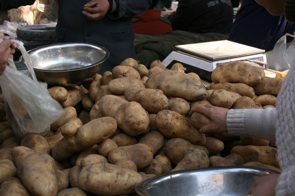
Just looking at the distance an item travels from the farm to the plate, however, doesn't tell the whole story of how much energy is associated with it. Fertilizers and pesticides used in conventional farming are energy-intensive to produce. Out-of-season produce may be ripened in heated greenhouses or stored in cold storage. And research (including a study out of Carnegie Mellon University) suggests that eating less meat and dairy is a more effective way to reduce the greenhouse gas emissions associated with your food because of meat's more energy-intensive production process.
看看一样食物从农场到餐桌所需要走的距离吧,不过,这也不能表明其一路上所浪费的所有能源。传统农业使用化肥和杀虫剂,是能源密集型的农业生产方式, 过季的产品可以在温室中催熟,或者储存在冰箱里。研究(包括一项由卡内基梅隆大学做的研究)表明少吃肉和乳制品是更有效的减少跟你所吃食物相关的温室气体排放的途径,因为肉类生产的过程是能源密集型的。
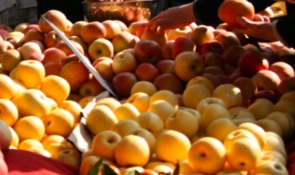
Illustrating these complications, a study out of Lincoln University in New Zealand looked at the whole lifecycle of producing lamb, apples, onions, and milk in both the U.K. and New Zealand, including factors such as use of fertilizers, mode of transportation, storage, watering, and animal housing. The study found that for three of the four items, overall CO2 emissions per ton of New Zealand products sent to the U.K. were actually lower than the emissions for same products produced in the U.K. and consumed domestically.
新西兰的林肯大学在英国和新西兰做的一项研究着眼于生产羊肉、苹果、洋葱以及牛奶的整个生命周期,包括化肥的使用、运输方式、储存、灌溉以及动物容纳设施等因素。这项研究发现四分之三的从新西兰运送到英国的产品,每吨产品的二氧化碳排放量,比英国本土生产并消费的同量产品的排放量低。
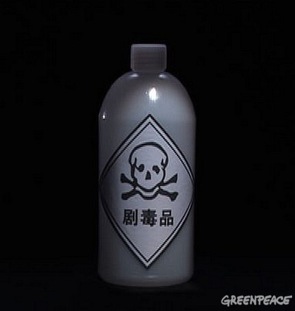
Greenpeace recommends that consumers focus first on food that's organic—since conventional items are produced with pesticides and fertilizers that are harmful to the environment. Last year, Greenpeace China sent 45 items of produce from Beijing supermarkets and wet markets to a lab—40 of the items had traces of pesticides, and some had up to 10 different chemicals on them.
绿色和平建议消费者首先关注绿色食品——因为传统作物的生产需要化肥和杀虫剂,这些都对环境有害。去年,绿色和平中国送了45份从北京的超市和露天市场中选取的样品到实验室去检测农药——40份样品中都有农药残留,有些甚至有多达10种不同的化学物质残留。
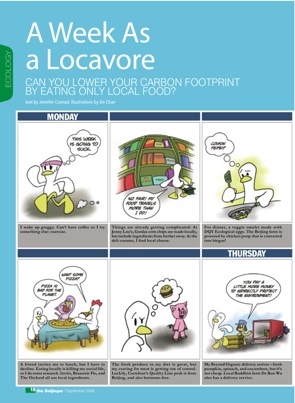
Thinking about the issues surrounding locavorism made me wonder how feasible it would be to eat this kind of diet in Beijing. So I spent five days eating locally grown and produced food and wrote about it for the September issue of The Beijinger.
思考围绕在土食主义周围的问题让我好奇在北京吃这种本土食物有多可行。于是我花了五天时间只吃本土种植生产的食物,并且将之写成文章刊载于The Beijinger的9月期上。

James told me: "Really, it's the vices that you miss. Alisa loves chocolate, and I like beer, and neither one is made in our area with local ingredients." That was true for me as well. One morning, I broke down and brewed a cup of coffee. And at the stroke of midnight on my last day, I had a beer waiting in my hand.
James跟我说:“确实,那会是你想念的恶习。Alisa喜欢巧克力,我喜欢啤酒,这两样都不是用我们本地产的原料做成的.”对我来说也是这样的。有一天早晨,我受不了了,煮了一杯咖啡。前一天晚上伴着午夜的钟声,我手里还捧着一杯啤酒。
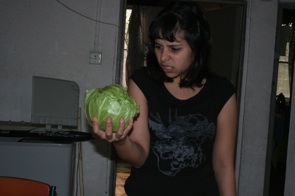
Ultimately, the idea isn't to do some sort of stunt—you'll end up eating a lot of weird things if you try to eat local all the time in Beijing. One night, I ate gluten-free soy pasta because it was the only local grain I could find. And in the winter, your options are severely limited. The main lesson is that you can be more conscious about where your food comes from.
最终,这个想法不是为了制造噱头——如果你试着在北京一直吃本地食品,最后你会发现自己吃了一些奇怪的烂货。有一天晚上我吃了无麸大豆面条,因为那是我唯一能找到的本地谷物。而且在冬天,你的选择受到了极大的限制。一个主要的经验教训就是你会对自己食物来自哪里更重视。
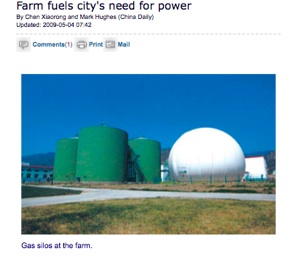
Carrefour labels its produce and meat by place of origin, and I found out that their Quality Line pork comes from Beijing pigs. There are several local dairies, including Green Yard and He Run. And I discovered DQY Organic eggs—a unique project where chicken manure powers the suburban Beijing facility, and the excess power is sold to the local grid, according to a China Daily article.
家乐福把他们的农产品和肉类都按照原产地贴标,并且我发现他们的品质线猪肉用的是北京的猪。北京有几家本地乳品公司,包括归原和合润。我还发现了德清原有机鸡蛋——根据中国日报的报道,这是一个独特的利用鸡的粪便为北京郊区工厂供能的项目,而且他们还将多余的电能卖给当地的电厂。
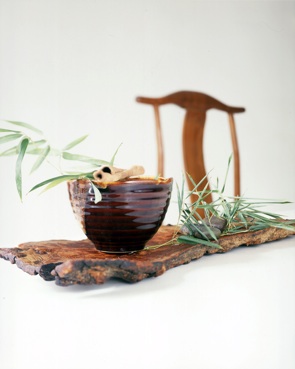
Some restaurants around Beijing grow a portion of their own produce or get ingredients from local and sustainable sources. The Orchard, out in Shunyi, grows herbs, fruit, and vegetables. Green T. House gets some of its produce locally. The restaurants at Crab Island use items from the organic farm on the premises.
一些北京周边的餐馆也种植部分他们需要的农产品,或者从本地可持续资源中获取原料。顺义的果园西餐厅自己种草本植物、水果和蔬菜。紫云轩从本地买一些他们需要的农产品。蟹岛的饭馆使用从签了协议的有机农场购买的食材。
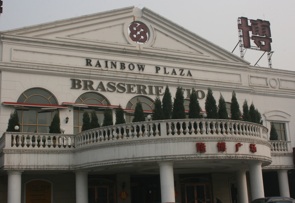
Brasserie Flo incorporates local items into its menu. Invito, an Italian restaurant in Solana, buys items from local organic supplier LOHAO City. "Tuscan food is very simple," explained Lorenzo Maraviglia, the restaurant's director of operations. "I prefer to spend a little more on the best ingredients because that's what it's all about."
福楼吸纳了很多本地食材到他们的菜单上。意吻陶, 一家在蓝色港湾SOLANA的意大利餐厅,从本地有机供应商乐活城购买食材。“托斯卡纳的食物很简单。”餐厅的运营经理 Lorenzo Maraviglia 这样解释道,“我更喜欢多花点心思在更好的原材料上,因为那才是根本。”
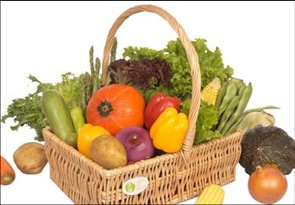
Some of the farms in the Beijing area, such as Dondon Farm in Haidian, have Community-Supported Agriculture (CSA) programs, in which consumers buy in at the beginning of the season and get a portion of what the farms produce. Organic and Beyond, De Run Wu, and Phoenix Hills Commune offer home delivery of produce from their farms. Dream Farm delivers organic vegetables and lets people rent plots to grow their own vegetables.
北京地区的一些农场有社区支持农业项目,比如海淀区的小毛驴市民农园。通过这种项目,消费者在季节开始的时候就购买并在收获的时候获得部分农产品。正谷、德润屋和凤凰公社还提供从农场派送到家的服务。梦想农场递送有机蔬菜并且允许顾客自己租一块地种植他们自己的蔬菜。
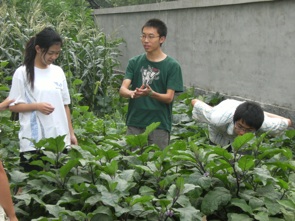
The Ao Xiang (Soar) club at Beijing Forestry University created a 130-square-meter organic farm on campus. Leader of the garden project Wu Yunlong told me that, "Our long-term goals are to promote organic farming and food-safety awareness. We hope that one day every neighborhood in Beijing will have an organic garden."
北京林业大学的翱翔俱乐部在校园里开垦了一个130平方米的有机农场。这个花园项目的负责人吴云龙告诉我:“我们的长期目标就是推广有机农场和食物安全意识。我们希望有一天北京所有的社区都能有一个有机花园。”
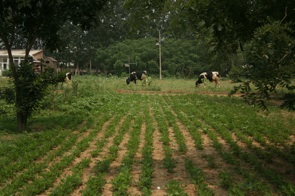
There are still several issues preventing local and organic food from becoming more common in Beijingers' diets. A lot of farmers and restaurants don't know what others are doing, and there's no organization to trade information or promote themselves as a group. Prices are much higher for organic than conventional items, but as there's more of a market, hopefully prices will go down. And Lejen Chen of the Green Cow says there's a need to train a new generation of farmers in organic practices.
我看到了下一步应该做的几点。很多农民和餐馆并不知道其他人在做什么,而且也没有组织来贩卖信息或将他们自己推广为一个组织。有机食品的价格也比普通的高很多,但是市场的前景不错,价格有希望降下来。绿牛农场的陈礼贞说有必要在有机种植上培养新一代农民。
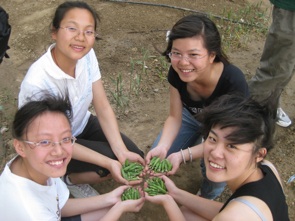
There are a few resources for finding organic and local products. The Beijing Organic Consumers Association is a Yahoo! Group with an active message board. Greenpeace China publishes an organic guide that's available on its website. Local writer Yinghui Zhang-Carraro has an online column in Chinese on organic food and natural living.
这里有几个能找到有机食品和本地食品信息的地方。北京有机消费者协会是一个在雅虎上的组织,有一个活跃的论坛。绿色和平中国出版过一个有机指南,在他们的网站上可以看到。本地作家张映辉有一个中文的关于绿色食品和自然生活方式的在线专栏。